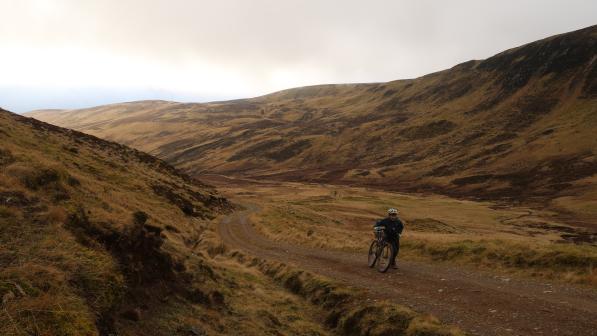Cycle lane consultation – a test case for action on climate change

During the coronavirus lockdown last year, the majority of councils in Scotland installed temporary cycle lanes and other infrastructure to help people safely socially distance while out walking and cycling. This was through the Scottish Government funded Spaces for People (SfP) programme.
The majority of schemes have been very successful and well received, with vocal opposition in only a few areas.
Opposition to cycle lanes in Edinburgh and the proposed East Craigs Low Traffic Neighbourhood (LTN) has been particularly fierce and gained attention, but there have been criticisms raised in other areas too.
I joined an online meeting convened by Jackson Carlaw MSP giving people a chance to provide opinions on new temporary cycle lanes close to where I live in East Renfrewshire.
Social media has provided a platform for many people to vent their frustrations and for the anti-cycling brigade to repeat those opinions because it conforms to their view of the world.
With politics and culture wars so polarised it’s almost impossible to have an honest open debate on Twitter. There’s certainly no excuse for vicious attacks on council officials or Sustrans staff.
When I occasionally look at the articles or Twitter threads written it’s often difficult to cut through the rhetoric and conflated issues.
There are all sorts of reasons why people have complained – from the perceived ugliness of bollards, to genuine concern for the safety of disabled people.
Others get to the heart of it and honestly say they just don’t want to have road space reallocated away from cars towards cycle lanes.
Lack of consultation?
One particular complaint about SfP is, however, important to debate because of the implications for the SfP schemes, future cycle lanes, and for wider action on climate change that requires changes to our way of life.
The argument is that SfP schemes have been foisted on people without proper consultation. This is at the heart of Alex Cole Hamilton’s vocal criticism of SfP in Edinburgh.
Sustrans published an SfP myth buster which explained that: “Although public consultations were not necessary for these emergency measures, many councils have had an open dialogue with their communities.”
Unfortunately, many people, including politicians, fail to remember that SfP was an emergency response to the dangers of coronavirus and the need for strict social distancing. Furthermore, that measures installed are temporary and can be learned from.
Councils are now beginning to consult on whether to make the temporary measures permanent.
Currently in Scotland an over-emphasis on consultation and a burdensome Traffic Regulation Order (TRO) process prevents the speedy installation of cycle lanes
Jim Densham, Cycling UK’s campaigns and policy manager for Scotland
Finding a balance
Sadly, the numerous benefits for people of cycle lanes, closed roads, slower traffic and wider pavements seem to have been lost in a blinkered argument about right process and consultation.
This ideological argument about consultation, process and change is described by Peter Oborne in the conclusion to his book The Assault on Truth.
On one side there are those who are more conventional and believe in due process and institutions to make change at a controlled pace, and on the other extreme there are progressives who desire to tackle big issues and ‘do the right thing’, but see existing processes as holding back and needing change.
This may be an oversimplification and a case of wrongly assigning everyone to extreme viewpoints; however, throw into the mix the use of social media and tribal politics and the debate is polarised and stifled. It’s not right when consultation leads to loud voices or minority interests preventing the greater good, but throwing out all consultation, debate and process can lead to undesirable consequences too.
Currently in Scotland an over-emphasis on consultation and a burdensome Traffic Regulation Order (TRO) process prevents the speedy installation of cycle lanes.
Worse is that this situation mirrors the inertia surrounding putting in place necessary actions to reduce climate emissions and making the processes we have now fit for the urgent challenge of addressing the climate emergency.
Urgent climate action
Alarmingly, Scottish Government statistics published this week showed that Scotland failed to meet its 2019 target to reduce climate emissions by 55%. This comes after missed targets in 2017 and 2018.
We need immediate strong action from the Scottish Government and Local Authorities if we are to meet our legal requirement to cut the emissions which cause climate change by 75% by 2030.
Scotland has policy in place for decarbonising transport, but it’s not enough action now. Cycling is part of the decarbonising solution and an alternative to driving for short everyday journeys. However, we are falling behind on the funding needed to construct the safe cycle lanes which will encourage more people to cycle.
Government must address this in the autumn budget and have the political will to pay less attention to the driving lobby and people who don’t want to change their driving habits.
Government also needs to address the processes which delay and stall the installation of cycle lanes or make the roads more cycle friendly.
Making safe space appear on our roads can be done quickly, as was shown by SfP.
[video:https://www.youtube.com/watch?v=EbW0mnTgQiI]
Streamlining Traffic Regulation Orders processes
It’s excellent therefore to see a consultation on Traffic Regulation Orders (TROs) as one of the first consultations from Transport Scotland after the election.
We agree with the proposals in the consultation to allow councils to make Experimental TROs more workable, so that new cycle lanes and other measures can easily be trialled while collecting public opinion as the experiment continues.
People and councils can then judge whether a new cycle lane works from lived experience rather than something proposed on paper.
Hopefully it will lead to informed opinions rather than knee-jerk reactions, and data on use of the measures being assessed to decide if a cycle lane should be made permanent.
We will aim to provide an analysis of the proposals in the coming weeks, but for now, look at the piece I wrote for GoBike in its Consultation Digest June edition.
Making Spaces for People permanent
Councils across Scotland are beginning to ask people if SfP schemes should now be made permanent.
There have also been consultations in Edinburgh and the Borders. It is vital that we take the opportunity to respond to these local consultations in our areas – if we don’t, we risk losing this and future cycling infrastructure.
Even if measures aren’t perfect for cyclists, we still need to find positive things to say and ask for the permanent versions to be better designed and maintained.
Glasgow City Council has a live consultation you can respond to if you are in this area.
In Aberdeen, there is a wider consultation on the Future of Aberdeen City Centre and the Beach.
Another way to have your say is to click on specific measures near you on the Sustrans’ Space to Move map.
If you see an SfP consultation for your area please let me know.




